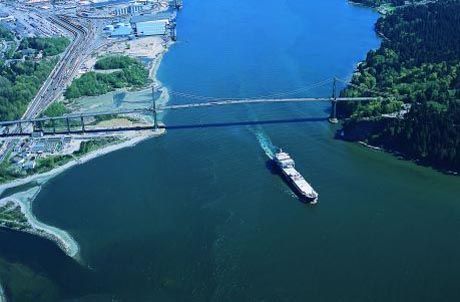News
You are here
Kinder-Morgan Trans Mountain Pipeline twinning – what it is and why it is a bad idea

February 3, 2014
In December 2013 Kinder-Morgan ended months of speculation, finally submitting a 15,000 page, two metre high application to the National Energy Board for twinning the 1156km long Trans Mountain Pipeline running from Edmonton, Alberta to Burnaby, BC.
This twinning will eventually increase the pipeline’s capacity from 50 million litres per day to 140 million litres per day. Kinder-Morgan plans to use the new pipeline to send diluted bitumen extracted from Alberta’s tar sands to primarily Asian markets.
Pipeline expansion
The new pipeline will follow the same route as the original pipeline until it reaches the Lower Mainland. Since 1952 when the original Trans Mountain Pipeline was built, there has been intensive urban development along the pipeline corridor leaving fewer options for expansion. Once the pipeline reaches the cities of Langley and Surrey, it will avoid new residential neighbourhoods by running closer to the Fraser River along existing railways and road corridors. Once it reaches Burnaby it will follow the Lougheed Highway corridor, meaning it will be extremely close to residential areas as well as the Burrard Inlet Conservation Area.
The oil pipeline’s terminus is at the Westridge Marine Terminal on Burrard Inlet, approximately 30 kilometres from the Strait of Georgia between the BC mainland and Vancouver Island. Kinder-Morgan plans to renovate the terminal to allow for docking and loading of three Aframax tankers at a time. Each Aframax tanker can hold almost 140 million litres of oil.
Tanker traffic in and out of Burrard Inlet is projected to increase from five tanker loadings per month to 34, from 60 tankers per year to 408. This increase in the number of oil tankers along with the other marine traffic in the inlet—cruise ships, the public transit SeaBus, and pleasure boats—increases the risk of an accident.
Whether through boat or pipeline spill, Kinder-Morgan says it is confident that it will be able to meet the BC Liberals “Five Conditions” for heavy oil pipelines. One of these conditions is have a “world-leading marine oil spill response, prevention and recovery systems for BC's coastline and ocean to manage and mitigate the risks and costs of heavy oil pipelines and shipments.”
Ecocidal spil
While being realistic in preparing for an inevitable spill, it is utopian to believe it can simply be cleaned up. Diluted bitumen does not behave like regular crude oil in seawater. A recent study by the Department of Fisheries and Oceans and the National Research Council has found that diluted bitumen sinks in salt water when it is battered by waves and mixed with ocean sediments. The study also showed that dispersants used to clean up conventional oil spills had a limited effect cleaning up diluted bitumen.
Spilled diluted bitumen will sink and coat the bottom of the ocean with a thick layer of goo requiring dredging to remove. Any floating and sunk diluted bitumen—as well as the diluting chemicals that vapourize in a spill—would lead to the death of marine flora and fauna by suffocation and poisoning. There would be severe disruption of food webs and a decline in biodiversity.
The Georgia Strait Alliance conservation group says it is likely that a tanker spill in this area would likely lead to the extinction of BC’s southern population of killer whales. It cites the example from the 1989 Exxon Valdez spill in Prince William Sound in Alaska where most of the killer whales of reproductive age in pod AT1 died; the pod is now headed for extinction.
Cleaning up an oil spill will not just be impossible, and time and labour intensive, it will also be expensive. Should there be a spill, Kinder-Morgan would likely be facing years of clean up costing billions of dollars. The Exxon Valdez spill has cost upwards of $3 billion USD, and the July 2010 spill of diluted bitumen from an Enbridge pipeline into the Kalamazoo River in Michigan is rapidly approaching $1 billion USD with more clean up still to be done.
Since 2005, there have been seven spills along the Trans Mountain Pipeline totaling approximately 800,000 litres of oil. According to the Kinder-Morgan website, around 6,880,000 litres have leaked from the pipeline since the 1960s.
Stop the tar sands, green jobs now
A recent Insights West poll of Lower Mainland residents showed more people aware of the Trans Mountain Pipeline twinning proposal, but opinion still divided over possible benefits. Levels of public support for the twinning are essentially unchanged: 43 per cent opposed, and 48 per cent in support. Others opposing the pipeline twinning include the BC NDP, the mayors of Burnaby and Vancouver, as well as First Nations leaders.
The Tsleil-Waututh Squamish and Musqueam First Nations all have traditional lands along Burrard Inlet, which will be severely affected in the event of a spill. The Tsleil-Waututh are on record as saying that pipeline expansion is “a risk too great to accept” and they will do what they can to protect their lands for future generations.
Expansion of tar sands extraction operations and oil pipelines like the Trans Mountain Pipeline are not the way to a sustainable energy future. Bitumen is one of the dirtiest fossil fuel projects on the planet. To get it out of the ground requires massive amounts of water and energy, and releases massive amounts of greenhouse gases that contribute to climate change. It is well past the time to eliminate fossil fuel use and develop renewable energy resources.
Section:










